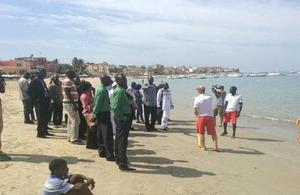Royal National Lifeboat Institution Visit to Senegal and The Gambia
A RNLI mission visited Senegal to deliver lifeguard training aimed at helping lifeguards save hundreds of people from drowning each year.

79.6 KB
An estimated 1.2 million people lose their lives to drowning each year – that’s more than those dying from malaria. The World Health Organization estimates that Africa has the highest continental drowning rate in the world. Through its international development activity, the RNLI is working with several African countries, including Senegal and the Gambia, to help them save lives.
Two RNLI instructors returned to Dakar, the capital of Senegal, where they first delivered lifeguard training a year ago. Over the past year, the Senegalese lifeguards have been running a full lifeguard service on Yoff beach, where drowning is sadly a common occurrence, using the skills they were taught by the RNLI last year. The RNLI instructors will now spend a week on Yoff beach, fine-tuning the newly-established lifesaving service and helping the Senegalese lifeguards to deliver training to a further 30 new lifeguards, ensuring the service can continue to expand, protect local people and save lives.
The objective of the instructors is to ensure that the lifeguards have a local training regime established, that the standard of the service is maintained and that monitoring systems are in place to help better understand incidents and how to respond. While in the country, the RNLI trainers will also identify opportunities for water safety education programmes, which can be delivered by the Senegalese lifeguards in schools. By delivering important water safety messages to young children, it is hoped many lives will be saved each year. After the week in Senegal, the RNLI instructors will move on to Banjul in the Gambia, where they will train 30 new volunteer lifeguards. This will be the first time RNLI instructors have delivered training in the Gambia, so they will cover the important first steps of lifeguarding, including: recognising when a person is in distress; how to use rescue equipment; beach surveillance, and rescuing and treating a casualty.
Steve Willis, the RNLI’s international development manager, explains: ‘Africa has a major drowning problem, and the RNLI is committed to helping to tackle this. By working with willing volunteers in countries like Senegal and the Gambia, we can help establish really strong coastal lifesaving services, with highly-trained lifeguards who know how to respond, rescue people and, most importantly, save lives. ‘Our work in Senegal began last December. Since then, the Senegalese lifeguards have been doing a fantastic job, using the skills they learnt to run a good lifesaving service. This time, we’re helping them fine-tune the service and train up even more lifeguards so the service can grow. In the Gambia, we’re at the point we were this time last year in Senegal – delivering that vital initial training to get them started. I’ve no doubt they will learn and grow as quickly and enthusiastically as the Senegalese lifeguards have done.
‘Each time we deliver training overseas, the sense of commitment and determination to save lives is really overwhelming. With the right training and dedication, these fledgling lifeguard services will go from strength to strength and, no doubt, save many lives from drowning.’
In Africa, the RNLI is also helping lifesaving services in Uganda, Cameroon, Kenya and Tanzania. Outside of Africa, the charity has been working with countries including Bangladesh, India, Brazil, Uruguay and the Philippines.
The RNLI has been stepping-up its international development work since 2011, to help developing lifesaving organisations and reduce the 1.2M drownings that occur around the world each year. The charity is focusing on helping other organisations to help themselves by providing a range of services such as training, safety education, and guidance on search and rescue frameworks and flood resilience. The RNLI’s international development work is funded primarily through overseas sales of consultancy, equipment and training to countries that require those services; and external / government funding where available. In time, the RNLI will begin to fundraise for specific international projects.